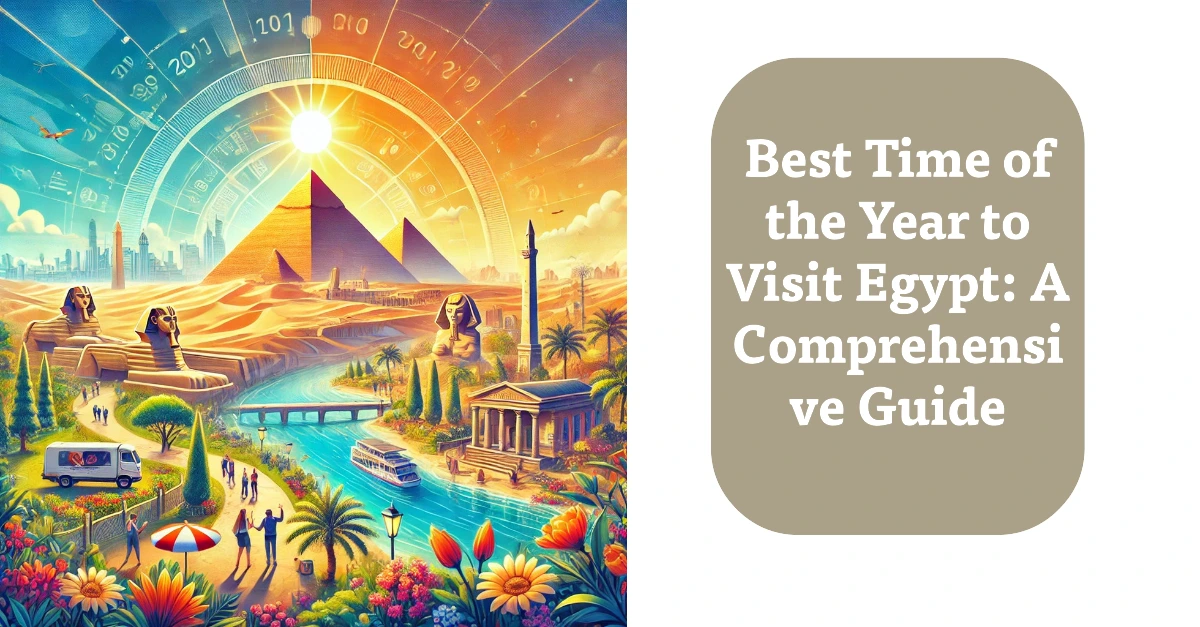Best Time of the Year to Visit Egypt: A Comprehensive Guide

Egypt, with its timeless pyramids, vast deserts, and the winding Nile River, is a destination that offers travelers a unique blend of ancient history and vibrant culture. However, when planning a trip to Egypt, the climate plays a crucial role in determining the best time to visit. With a predominantly desert landscape, Egypt experiences extreme heat in certain months, making timing essential for a comfortable and enjoyable experience.
Here’s a comprehensive guide to help you plan your trip and choose the best time of year to visit Egypt.
The Peak Season (October to April)
The best time to visit Egypt is during the cooler months of October to April. This period offers pleasant daytime temperatures, making it ideal for sightseeing, especially in cities like Cairo, Luxor, and Aswan.
October to November:
This early autumn period is one of the most popular times for tourists. The weather is mild, with daytime temperatures ranging from 20°C to 30°C (68°F to 86°F), perfect for exploring the Pyramids of Giza, the Valley of the Kings, or taking a cruise along the Nile.
December to February:
Egypt’s winter season is a favorite for visitors due to the cooler temperatures. Average daytime temperatures range from 15°C to 20°C (59°F to 68°F), but nights can get chilly, especially in the desert. This is the peak tourist season, so expect larger crowds at major attractions. However, the cooler weather allows for more comfortable exploration of outdoor sites like the temples of Abu Simbel and outdoor markets (souks).
March to April:
The weather begins to warm up slightly, but it’s still comfortable for sightseeing. Flowers bloom during this time, especially along the Nile, making it an especially scenic time to visit. Spring is also a great time for outdoor activities such as hot air balloon rides in Luxor or exploring Egypt’s Red Sea resorts.
The Shoulder Season (May and September)
For those looking to avoid the larger tourist crowds but still enjoy manageable weather, the shoulder season is a good option.
May: Temperatures in May begin to rise, especially in Upper Egypt (southern regions), where it can reach over 35°C (95°F). While the heat may be intense in some areas, it’s still bearable in northern Egypt and the coastal areas. If you’re focusing on Cairo and the Mediterranean coast, May can be a pleasant time to visit.
September: Similar to May, September is a transition month. After the summer heat, temperatures begin to drop slightly, making it a more comfortable time for sightseeing and exploring. September also offers fewer crowds compared to the peak winter months, allowing you more space to explore Egypt’s top attractions.
The Low Season (June to August)
June to August is considered Egypt’s low season due to the intense heat, especially in the southern regions. During these summer months, temperatures in Luxor and Aswan can soar above 40°C (104°F), making it challenging to visit outdoor sites. However, if you’re well-prepared and don’t mind the heat, there are some advantages to visiting Egypt during the low season.
Cheaper Travel Costs:
Since it’s the off-season for tourism, you can find significant discounts on hotels, tours, and flights. This makes summer a budget-friendly time for travelers who don’t mind the heat.
Beach Resorts:
If you’re visiting Egypt for its beautiful beaches and resorts, especially along the Red Sea or the Mediterranean coast, summer can still be a great time. Destinations like Sharm El Sheikh, Hurghada, and Dahab enjoy refreshing breezes from the sea, making the high temperatures more tolerable. Plus, the crystal-clear waters are perfect for diving, snorkeling, and other water activities.
Nighttime Activities:
During the summer, it’s common to see Egyptians and tourists alike enjoying the cooler evening temperatures. Nighttime excursions, such as visiting the pyramids or the Luxor Temple under the stars, can be a magical experience in the summer months.
Festivals and Events
While the weather is an essential factor in deciding when to visit Egypt, timing your trip with cultural events and festivals can add a unique dimension to your travel experience. Some key events to consider:
Ramadan:
Ramadan is a month of fasting observed by Muslims worldwide. During this time, many businesses may have reduced hours, but it’s also an excellent time to experience Egypt’s vibrant nightlife after sunset, when the streets come alive with food, music, and celebration. The exact dates for Ramadan vary each year based on the Islamic lunar calendar.
Sun Festival at Abu Simbel:
Occurring twice a year (on February 22 and October 22), the Sun Festival at Abu Simbel celebrates the moment when sunlight illuminates the statues of Ramses II inside the temple. It’s a fantastic cultural event that draws visitors from around the world.
Coptic Christmas:
Celebrated on January 7, this religious holiday is an essential event in Egypt’s Christian communities. Visiting Egypt during this time allows you to witness Christmas celebrations in historic Coptic churches in Cairo and other regions.
Conclusion: Best Time to Visit Based on Preferences
- For Sightseeing and Cultural Exploration: The best time to visit Egypt is from October to April when temperatures are cooler, and you can comfortably explore the country’s historical sites.
- For Budget Travel: If you’re looking to save money on accommodation and flights, the summer months from June to August offer lower prices, although the heat can be intense.
- For Beach Holidays: For those planning to relax on Egypt’s coasts, both summer (June to September) and spring (March to May) are excellent times to visit the Red Sea and Mediterranean resorts.
Ultimately, the best time to visit Egypt depends on your preferences and the type of experience you’re seeking. Whether you want to explore ancient wonders, relax by the sea, or experience Egypt’s vibrant festivals, there’s a perfect time for every traveler.



